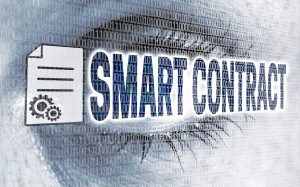Smart Contracts Taking Over: Pros, Cons, And How to Stay On Top of It All
As this technology develops and reaches its full potential in business, it is important to stay up to date because its effects will likely be felt in nearly every industry.
 If you’ve been following this series on blockchain, you now know blockchain’s disruption beyond bitcoin, how that disruption is affecting different industries, and how to get yourself ready for that cross-industry disruption. In the most recent articles, you’ve learned about smart contracts, a transformative new technology powered by blockchain that can revolutionize the way businesses process deals, and the many ways they’ll affect industries. Now that you understand smart contracts, you may be wondering what you should do about them! Smart contracts have many pros and cons, and as the technology evolves, it is important to keep up and stay informed.
If you’ve been following this series on blockchain, you now know blockchain’s disruption beyond bitcoin, how that disruption is affecting different industries, and how to get yourself ready for that cross-industry disruption. In the most recent articles, you’ve learned about smart contracts, a transformative new technology powered by blockchain that can revolutionize the way businesses process deals, and the many ways they’ll affect industries. Now that you understand smart contracts, you may be wondering what you should do about them! Smart contracts have many pros and cons, and as the technology evolves, it is important to keep up and stay informed.
Benefits of Smart Contracts
Smart contracts carry a high degree of trust. They also increase accuracy because the manual errors are eliminated. The smart contract is encrypted and distributed among nodes. This guarantees that it will not be lost or changed without your permission. Another benefit is that most processes are automated. Similarly, most intermediaries are eliminated. A user is making the agreement — there’s no need to rely on a broker, lawyer, or other intermediaries to confirm.

Is The Future Of Law Distributed? Lessons From The Tech Adoption Curve
Other security measures are built into smart contracts as well. Backups and duplicates are built into the system. Safety is certain with smart contracts. Cryptography, the encryption of websites, keeps your documents safe. There is no hacking. In fact, it would take an abnormally smart hacker to crack the code and infiltrate a smart contract.
Smart contracts also produce increased speed and efficiencies because the paperwork and manually process are avoided. There will also be increased savings because smart contracts ultimately save you money.
Drawbacks of Smart Contracts
Of course, there are also drawbacks to be aware of. For example, ultimately, the code is written by people, and they can make mistakes. A good example of the human error is the DAO, where developers’ mistakes in the code were costly for the users and the company. Hackers exploited the errors and stole about $60 million.
Sponsored

Is The Future Of Law Distributed? Lessons From The Tech Adoption Curve

The Business Case For AI At Your Law Firm


Navigating Financial Success by Avoiding Common Pitfalls and Maximizing Firm Performance

The Business Case For AI At Your Law Firm

Another issue is smart contracts’ regulatory status. Currently, smart contracts are not clearly regulated by any government, a reality that may change. Smart contracts are also high-maintenance in terms of the engineering expertise required to get them up and running. Smart contracts require an experienced coder to make fail-proof smart contracts that work with company’s existing technology and processes.
How Can We Keep Up?
Education, curiosity, learning by doing, and engaging regulators are the best ways I know to cope with fundamental technology changes — and smart contracts are no different.
To get yourself a more in-depth look at smart contracts, you can pick up a book on the topic. A few that I recommend include:
- Blockchain Revolution: How the Technology Behind Bitcoin Is Changing Money, Business, and the World by Alex Tapscott and Don Tapscott
- The Business Blockchain: Promise, Practice, and Application of the Next Internet Technology by William Mougayar
- Blockchain for Beginners: Guide to Understanding the Foundation and Basics of the Revolutionary Blockchain Technology by Scott Marks
- Blockchain: Ultimate guide to understanding blockchain, bitcoin, cryptocurrencies, smart contracts and the future of money by Mark Gates
- Ethereum: Blockchains, Digital Assets, Smart Contracts, Decentralized Autonomous Organizations by Henning Diedrich
- The Blockchain: A Guide for Legal and Business Professionals, by Shawn Amuial
Sponsored

Legal AI: 3 Steps Law Firms Should Take Now

Generative AI In Legal Work — What’s Fact And What’s Fiction?

If you’d like more dynamic, updated information, podcasts, talks, and other similar educational resources will help you stay up to date on the very latest information. Major players in this space include:
- Blockchain at Berkeley
- Talks by Bettina Warburg, including TED talks
- a16z Podcast hosted by Andreessen Horowitz, a premier venture capital firm
- Coin Mastery hosted by Carter Thomas, Investor and Marketer
- Unchained hosted by Laura Shin, Senior Editor at Forbes
And, of course, for those of us who like to learn online, here is a collection of online resources from organizations pioneering this exciting new technology:
- Global Legal Blockchain Consortium
- Global Legal Hackathon
- IBM Resources, including Blockchain 101
- edX online course, Blockchain for Business
- Ethereum Introduction
- Ethereum White Paper
- Ethereum Yellow Paper
- Deloitte paper on use of blockchain for smart contracts
- Deloitte paper on blockchain for Supply Chain Management
As you’ve explored through this series of articles, smart contracts are an exciting new blockchain-based technology that has already led to exciting developments across industries. As this technology develops and reaches its full potential in business, it is important to stay up to date because its effects will likely be felt in nearly every industry — including your own legal practice! By doing research and staying informed, you can weigh the pros and cons for yourself and advise your clients on the future of contracts.
 Olga V. Mack is an award-winning general counsel, operations professional, startup advisor, public speaker, adjunct professor at Berkeley Law, and entrepreneur. Olga founded the Women Serve on Boards movement that advocates for women to serve on corporate boards of Fortune 500 companies. Olga also co-founded SunLaw to prepare women in-house attorneys become general counsel and legal leaders and WISE to help women law firm partners become rainmakers. She embraces the current disruption to the legal profession. Olga loves this change and is dedicated to improving and shaping the future of law. She is convinced that the legal profession will emerge even stronger, more resilient, and inclusive than before. You can email Olga at olga@olgamack.com or follow her on Twitter @olgavmack.
Olga V. Mack is an award-winning general counsel, operations professional, startup advisor, public speaker, adjunct professor at Berkeley Law, and entrepreneur. Olga founded the Women Serve on Boards movement that advocates for women to serve on corporate boards of Fortune 500 companies. Olga also co-founded SunLaw to prepare women in-house attorneys become general counsel and legal leaders and WISE to help women law firm partners become rainmakers. She embraces the current disruption to the legal profession. Olga loves this change and is dedicated to improving and shaping the future of law. She is convinced that the legal profession will emerge even stronger, more resilient, and inclusive than before. You can email Olga at olga@olgamack.com or follow her on Twitter @olgavmack.








